

E. Coli and Quality First Teaching.
The pupil premium is not working (part I): Do not measure attainment gaps – Becky Allen. On Saturday 8th September 2018 I gave a talk to researchED London about the pupil premium.
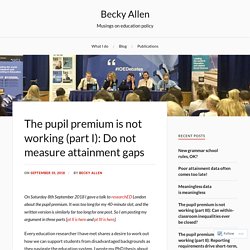
It was too long for my 40-minute slot, and the written version is similarly far too long for one post. So I am posting my argument in three parts [pt II is here and pt III is here]. Every education researcher I have met shares a desire to work out how we can support students from disadvantaged backgrounds as they navigate the education system. I wrote my PhD thesis about why school admissions help middle class families get ahead. No politician is crazy enough to do anything about that; but they have been brave enough to put their money where their mouth is, using cash to try to close the attainment gap. Money, money, money… We think about attaching money to free school meal students as a Coalition policy, but the decision to substantially increase the amount going to schools serving disadvantaged communities came during the earlier Labour Government.
Chain-Effects-2018. Hampshire-report8-1. Ark Brunel Primary Academy. The problem with pupil premium. I attended The Key's conference in Birmingham recently.
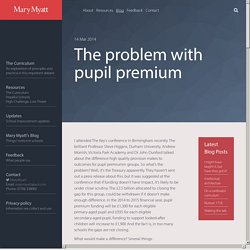
The brilliant Professor Steve Higgins, Durham University, Andrew Morrish, Victoria Park Academy and Dr John Dunford talked about the difference high quality provision makes to outcomes for pupil premiumm groups. So what's the problem? Well, it's the Treasury apparently. They haven't sent out a press release about this, but it was suggested at the conference that if funding doesn't have impact, it's likely to be under close scrutiny. The £2.5 billion allocated to closing the gap for this group, could be withdrawn if it doesn't make enough difference.
What would make a difference? There needs to be a pupil premium 'champion' at senior leadership level. Since September 2013, Ofsted has given a sharper focus to the performance and progress of pupil premium pupils in their inspections. Call for action to end children’s ‘battery-hen existence’ in summer holidays. Urgent action is needed to stop children leading a “battery hen existence” during the summer holidays that is damaging their mental health, contributing to violence and ensuring they return to school in worse health than when they left, the children’s commissioner for England has warned.

In an interview with the Observer, Anne Longfield said radical measures were needed to restore the importance of play, such as overhauling play areas and parks, and encouraging GPs to recommend “play on prescription”. She pointed to evidence showing that cardiovascular health and obesity levels deteriorate over the summer break as children stay indoors on computers and phones. Longfield called for the funds raised by the government’s “sugar tax” to be used to ensure attractive play schemes were located in the right areas and gave children and parents a safe, exciting and affordable facility.
“We all remember how important the long school holidays were,” said Longfield. Call for action to end children’s ‘battery-hen existence’ in summer holidays. Building Resilience in the UK and Ireland. The 3Rs of Working with Disadvantaged Pupils. Statistically, working in a school with a large number of disadvantaged pupils of white ethnic origin isn’t likely to lead to many accolades or much acknowledgement.
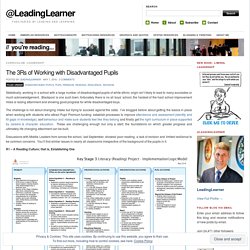
Blackpool is one such town; fortunately there is no all boys’ school; the hardest of the hard school improvement miles is raising attainment and showing good progress for white disadvantaged boys. The challenge is not about changing intake but trying to succeed against the odds. I’ve blogged before about getting the basics in place when working with students who attract Pupil Premium funding: establish processes to improve attendance and assessment (identify and fill gaps in knowledge); sort behaviour and make sure students feel like they belong and finally get the right curriculum in place supported by careers & character education. These are challenging enough but only a start; the foundations on which greater progress and ultimately life changing attainment can be built. R1 – A Reading Culture; that is, Establishing One. Long-term disadvantage, part one: Challenges and successes – Education Datalab.
This is part one in a series of blogposts exploring long-term disadvantage.
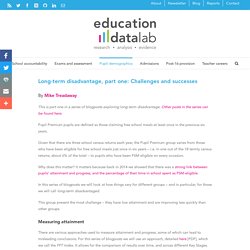
Other posts in the series can be found here. Pupil Premium pupils are defined as those claiming free school meals at least once in the previous six years. Given that there are three school census returns each year, the Pupil Premium group varies from those who have been eligible for free school meals just once in six years – i.e. in one out of the 18 termly census returns; about 6% of the total – to pupils who have been FSM-eligible on every occasion. Why does this matter? It matters because back in 2014 we showed that there was a strong link between pupils’ attainment and progress, and the percentage of their time in school spent as FSM-eligible. Attainment gap for long-term disadvantaged 'is widening'
The attainment gap between children who are "long-term disadvantaged" and their peers has been growing in recent years, new research reveals.
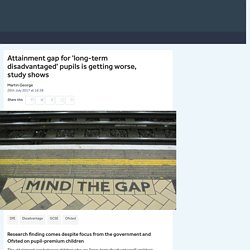
The finding, published by Education Datalab this afternoon, highlights the challenge facing schools as they are asked to improve the performance of children eligible for the pupil premium. Pupil Premium…(Again!) At my new school we have been thinking about how to allocate our Pupil Premium funding for our brand new cohort.
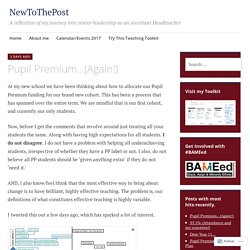
This has been a process that has spanned over the entire term. We are mindful that is our first cohort, and currently our only students. Now, before I get the comments that revolve around just treating all your students the same. Along with having high expectations for all students. I do not disagree. AND, I also know/feel/think that the most effective way to bring about change is to have brilliant, highly effective teaching. I tweeted this out a few days ago, which has sparked a lot of interest.